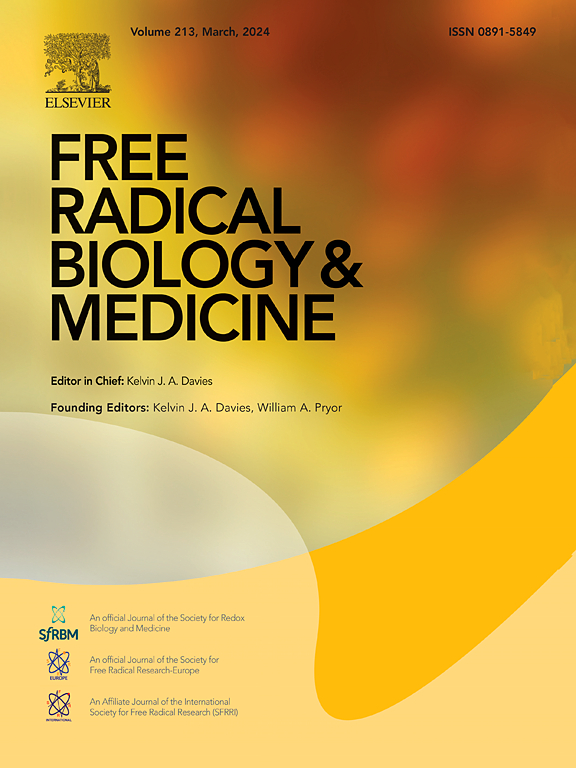2-乙酰乳糖苷通过PI3K/Akt途径促进神经发生,从而改善缺血性中风后的恢复。
IF 7.1
2区 生物学
Q1 BIOCHEMISTRY & MOLECULAR BIOLOGY
引用次数: 0
摘要
缺血性中风会诱导室下区(SVZ)的成神经发生,即使是老年患者也不例外。利用这种神经再生反应为中风后的康复提供了治疗潜力。我们发现,从肉苁蓉中提取的苯乙醇苷(PhGs)可通过促进神经再生来帮助中风后的神经修复。其中,2-乙酰内酯苷对体外神经干细胞(NSCs)的增殖作用最强。此外,2-乙酰乳糖苷还能通过增加体内和体外的神经发生来缓解神经功能障碍。RNA 序列分析强调了 PI3K/Akt 信号通路中的差异表达基因。Western 印迹分析证实,候选靶点 Akt 受 2-acetylacteoside 调节,而 2-acetylacteoside 在氧-葡萄糖剥夺/复氧(OGD/R)后反过来又增强了培养的 NSCs 的增殖和分化。随后使用成人室下区(SVZ)培养的 NSCs 进行的分析证实,2-乙酰乳糖苷能增强磷酸化 Akt(p-Akt)的表达,而且它对 NSC 神经发生的影响依赖于 PI3K/Akt 通路。总之,我们的研究结果首次阐明了2-乙酰乳糖苷在缺血性脑损伤后主要通过激活Akt促进神经发生来增强神经功能恢复的作用,这为缺血性脑卒中的长期脑功能恢复提供了一种新策略。本文章由计算机程序翻译,如有差异,请以英文原文为准。

2-Acetylacteoside improves recovery after ischemic stroke by promoting neurogenesis via the PI3K/Akt pathway
Ischemic stroke induces adult neurogenesis in the subventricular zone (SVZ), even in elderly patients. Harnessing of this neuroregenerative response presents the therapeutic potential for post-stroke recovery. We found that phenylethanoid glycosides (PhGs) derived from Cistanche deserticola aid neural repair after stroke by promoting neurogenesis. Among these, 2-acetylacteoside had the most potent on the proliferation of neural stem cells (NSCs) in vitro. Furthermore, 2-acetylacteoside was shown to alleviate neural dysfunction by increase neurogenesis both in vivo and in vitro. RNA-sequencing analysis highlighted differentially expressed genes within the PI3K/Akt signaling pathway. The candidate target Akt was validated as being regulated by 2-acetylacteoside, which, in turn, enhanced the proliferation and differentiation of cultured NSCs after oxygen-glucose deprivation/reoxygenation (OGD/R), as evidenced by Western blot analysis. Subsequent analysis using cultured NSCs from adult subventricular zones (SVZ) confirmed that 2-acetylacteoside enhanced the expression of phosphorylated Akt (p-Akt), and its effect on NSC neurogenesis was shown to be dependent on the PI3K/Akt pathway. In summary, our findings elucidate for the first time the role of 2-acetylacteoside in enhancing neurological recovery, primarily by promoting neurogenesis via Akt activation following ischemic brain injury, which offers a novel strategy for long-term cerebrological recovery in ischemic stroke.
求助全文
通过发布文献求助,成功后即可免费获取论文全文。
去求助
来源期刊

Free Radical Biology and Medicine
医学-内分泌学与代谢
CiteScore
14.00
自引率
4.10%
发文量
850
审稿时长
22 days
期刊介绍:
Free Radical Biology and Medicine is a leading journal in the field of redox biology, which is the study of the role of reactive oxygen species (ROS) and other oxidizing agents in biological systems. The journal serves as a premier forum for publishing innovative and groundbreaking research that explores the redox biology of health and disease, covering a wide range of topics and disciplines. Free Radical Biology and Medicine also commissions Special Issues that highlight recent advances in both basic and clinical research, with a particular emphasis on the mechanisms underlying altered metabolism and redox signaling. These Special Issues aim to provide a focused platform for the latest research in the field, fostering collaboration and knowledge exchange among researchers and clinicians.
 求助内容:
求助内容: 应助结果提醒方式:
应助结果提醒方式:


